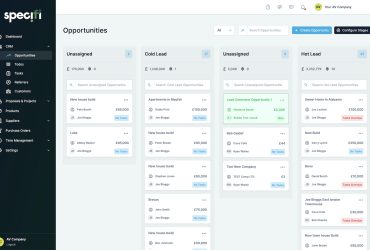The latest candidate in our series of Q&As with influential women in the technology business in Canada is Jessica Mosher, Executive Vice President, Managing Director, Nelson, an education publisher and developer of the digital learning ecosystem Edwin
Name: Jessica Mosher
Job Title: Executive Vice President, Managing Director, Nelson
Years in the Industry: 25 Years
The Quote That Most Inspires You: “This too shall pass.” (Persian adage)
What drew you to a career in the consumer and/or business technology industry?
I was drawn to Educational Technology (EdTech) because of the foundational importance of education in our society and the need to ensure students of today are acquiring the necessary skills and competencies for a rapidly changing world. Technology, when informed with the appropriate pedagogical framework and content, enables great things in the classroom and beyond. This is why I am so proud of the work being done at Nelson with the launch of Edwin, our digital learning platform. Edwin addresses concerns around equity by providing all the
curriculum aligned content and tools needed for students and teachers. Every child should have access to the learning materials they need to succeed, and every teacher should be supported with access to the appropriate resources.
Have you encountered any roadblocks along the way that were related to your gender?
My gender has been a factor in some instances. It has seemed at times that my point of view is not recognized as readily as some of my male colleagues, and I have found many instances where I am the only woman, or one of a few, at the conference table. But I learned early on to surround myself with a strong support network and have had great mentors, both female and male, who have provided guidance to help get through any serious roadblocks.

What unique characteristics or perspective do you feel you bring to your organization as a woman?
I have had great opportunities throughout my career to progress into roles with increasing responsibilities. During this time, I have also been raising my three kids, and six years ago, I lost my mother to a long battle with early onset dementia. I think my personal experiences have allowed me to better understand my team’s challenges in trying to balance success at work with a healthy home life. Many members of my team are in those crunch years—kids and/or aging parents, and the past year and a half of the pandemic has only exacerbated these pressures. I have had people tell me that my openness about the challenges of trying to balance priorities have helped them feel supported and allowed for opportunities to find solutions that work for them and their families.
Technology is historically a male-dominated industry, yet the use of tech is fully embraced by women, and many studies even suggest that females are the primary buyers of tech in the home. What do you feel the technology industry needs in order to attract more women, particularly into high-level positions?
Although there has been recognition of the need for more inclusivity and diversity, leadership in EdTech tends to still be male dominated, with little representation of diversity. I attended a global EdTech conference recently and about 90% of the speakers were men. Given the issues we are trying to address in education around access and equity, it is critical that there is better representation in leadership roles.
I believe one of the primary challenges in attracting more women, particularly into high-level positions, is work/life balance. Unfortunately, the years when opportunities for more managerial and leadership positions are introduced, is often when people are also starting families. Given the pressures around raising kids along with the need to often work long hours and travel in advancing to another role, many women are forced to choose, and often do not go for that next promotion.
Organizations across different industries have been forced to look at this throughout the pandemic, and I am hopeful one of our “new normals” when the world opens up again will be different expectations for career development, be it more flexibility around travel requirements, time spent in the office, and so on. This could mean more people with multiple responsibilities at home also have opportunities to advance their careers.
If you had to sum up what it is like being a woman in this male-dominated technology industry in just a few words, what would you say?
Empowering, frustrating and challenging are the words that come to mind.
Are there other women in the tech industry who inspire you?
I have been fortunate to work directly with many amazing women in the industry. Two individuals I have admired from a distance also come to mind: Marjorie Scardino and Susan Duinhoven. Both have run large organizations and have had great vision on the transformative power of technology in media and education. In addition, recently I was asked to join Locelle, an organization started by Humaira Ahmed, that helps science and technology companies attract and develop top female talent. Humaira’s vision matches mentors and mentees and is helping many organizations develop their leadership pipeline.
What are some of the misconceptions/myths about women working in the technology space that you’d like to dispel?
The majority of start-up technology companies are run by men and private equity companies investing in start-ups are male dominated. I believe there are some myths that perpetuate this imbalance—the idea that the start-up landscape is an equal playing field—all it takes is a good idea, a lot of hard work and the right backing. The reality is more nuanced than this and ignores some of the barriers to entry. The landscape is changing, but it requires a more honest look at the realities of inequity and bias in education, opportunity, and networking.
What’s one thing you wish was done differently in the industry, and why?
I have always worked for established companies that are transforming—it has been very challenging and very satisfying. Looking back, it would have been interesting to work for a smaller EdTech organization to learn about the industry from that point of view.
Are you optimistic for the future in general and for the industry?
I am very optimistic for the future of EdTech. Education, particularly K12 education, is an essential part of society. But changes are needed in how and what students learn and the tools and support we are providing teachers. The pandemic has shown us this on a global scale. Technology informed by proven educational practice and content, enables great things, which is why I’m excited by the work we are doing at Nelson with Edwin.
At a time when flexibility around learning has become necessary, we’ve seen tremendous need for equitable access to resources so students can stay connected and engaged whether they are sitting in a classroom or at the kitchen table. Edwin is being used by hundreds of thousands of students and teachers across the country. For our classrooms that were using Edwin prior to the pandemic, we saw no interruption in usage—meaning students and teachers were able to move seamlessly to teaching and learning at home when required. As we look to ensure students of today are acquiring the skills they will need to succeed, it is important that we continue to adapt resources and tools to the needs of this digital savvy generation of learners.









